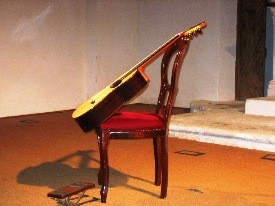28,005 views
SUBSCRIBEEMBEDREPORT
00
This is probably the most beautiful song by Chico Buarque abd Edu Lobo:
Eduardo de Góes "Edu" Lobo (born August 29, 1943) is a Brazilian singer, guitarist, and composer.du Lobo, 1963.
In the 1960s he was part of the bossa nova movement.His compositions include Upa Neguinho (with Gianfrancesco Guarnieri), Pra Dizer Adeus (with Torquato Neto; also known in its English version as "To say goodbye"), Choro Bandido, A história de Lily Braun, Beatriz (the latter three songs with Chico Buarque), Arrastão and Canto triste (both with Vinicius de Moraes), and Ponteio (with Capinam). Ponteio won best song at the 3rd Festival de Música Popular Brasileira in the recording by Quarteto Novo in 1967.
Francisco Buarque de Hollanda (born 19 June 1944), popularly known simply as Chico Buarque, is a Brazilian singer-songwriter, guitarist, composer, playwright, writer, and poet. He is best known for his music, which often includes social, economic, and cultural reflections on Brazil.
The firstborn son of Sérgio Buarque de Hollanda, Buarque lived at several locations throughout his childhood, though mostly in Rio de Janeiro, São Paulo, and Rome. He wrote and studied literature as a child and found music through the bossa nova compositions of Tom Jobim and João Gilberto. He performed as a singer and guitarist in the 1960s as well as writing a play that was deemed dangerous by the Brazilian military dictatorship of the time. Buarque, along with several Tropicalist and MPB musicians, was threatened by the Brazilian military government and eventually left Brazil for Italy in 1969. However, he came back to Brazil in 1970, and continued to record, perform, and write, though much of his material was suppressed by government censors. He released several more albums in the 1980s and published three novels in the 1990s and 2000s.
MARCO PEREIRA is one of the most influential "classical-Jazz" musicians of the Brazilian musical scene . Marco Pereira was born in Sao Paulo and got classical guitar lessons with the uruguayan master Isaias Sávio and music theory lessons at the Music and Drama Conservatory of São Paulo. He lived in France for five years and received a classical guitar master's degree in performance from the Université Musicale Internationale of Paris, and a master's degree in Musicology from the University of Paris-Sorbonne with his thesis Heitor Villa-Lobos and his guitar work (Editora Musimed – Brasília – Brasil). In Paris, he was strongly influenced by jazz and Latin-American music which characterizes his compositional work, added to Brazilian styles. He performed with great success at 9ème Festival de Jazz de Paris that allowed him to perform in Germany, France, Switzerland, Denmark, Italy, Austria, Canada and the United States. In Spain, he won two awards in important international guitar competitions: Concurso Andrés Segóvia (Palma de Mallorca) and Concurso Francisco Tárrega (Valencia).
Eduardo de Góes "Edu" Lobo (born August 29, 1943) is a Brazilian singer, guitarist, and composer.du Lobo, 1963.
In the 1960s he was part of the bossa nova movement.His compositions include Upa Neguinho (with Gianfrancesco Guarnieri), Pra Dizer Adeus (with Torquato Neto; also known in its English version as "To say goodbye"), Choro Bandido, A história de Lily Braun, Beatriz (the latter three songs with Chico Buarque), Arrastão and Canto triste (both with Vinicius de Moraes), and Ponteio (with Capinam). Ponteio won best song at the 3rd Festival de Música Popular Brasileira in the recording by Quarteto Novo in 1967.
Francisco Buarque de Hollanda (born 19 June 1944), popularly known simply as Chico Buarque, is a Brazilian singer-songwriter, guitarist, composer, playwright, writer, and poet. He is best known for his music, which often includes social, economic, and cultural reflections on Brazil.
The firstborn son of Sérgio Buarque de Hollanda, Buarque lived at several locations throughout his childhood, though mostly in Rio de Janeiro, São Paulo, and Rome. He wrote and studied literature as a child and found music through the bossa nova compositions of Tom Jobim and João Gilberto. He performed as a singer and guitarist in the 1960s as well as writing a play that was deemed dangerous by the Brazilian military dictatorship of the time. Buarque, along with several Tropicalist and MPB musicians, was threatened by the Brazilian military government and eventually left Brazil for Italy in 1969. However, he came back to Brazil in 1970, and continued to record, perform, and write, though much of his material was suppressed by government censors. He released several more albums in the 1980s and published three novels in the 1990s and 2000s.
MARCO PEREIRA is one of the most influential "classical-Jazz" musicians of the Brazilian musical scene . Marco Pereira was born in Sao Paulo and got classical guitar lessons with the uruguayan master Isaias Sávio and music theory lessons at the Music and Drama Conservatory of São Paulo. He lived in France for five years and received a classical guitar master's degree in performance from the Université Musicale Internationale of Paris, and a master's degree in Musicology from the University of Paris-Sorbonne with his thesis Heitor Villa-Lobos and his guitar work (Editora Musimed – Brasília – Brasil). In Paris, he was strongly influenced by jazz and Latin-American music which characterizes his compositional work, added to Brazilian styles. He performed with great success at 9ème Festival de Jazz de Paris that allowed him to perform in Germany, France, Switzerland, Denmark, Italy, Austria, Canada and the United States. In Spain, he won two awards in important international guitar competitions: Concurso Andrés Segóvia (Palma de Mallorca) and Concurso Francisco Tárrega (Valencia).

Guest comment
Comment too short or empty!
Enter your name, minimum 3 characters long!
0 Comment
Related suggestions
Show More








